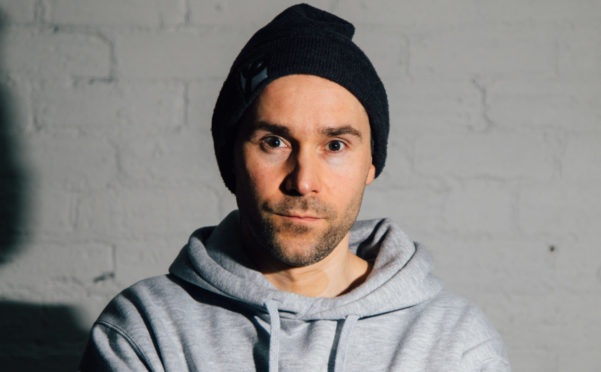
In the world of academia, he is Dr Dave Hook. To his students he is a fully-qualified professor of rap. And to music fans he is Solareye, frontman of hip-hop collective Stanley Odd.
The lyricist, producer, poet and academic has been helping dispel preconceptions of Scottish hip hop since Stanley Odd’s debut album Oddio in 2010.
Since then, the Edinburgh-based sextet have released two more full-length albums – with a fourth due later this year – while Dave himself released his first solo project All These People Are Me under his Solareye moniker, winning best hip-hop album at the 2018’s Scottish Alternative Music Awards.
A stalwart of the underground hip-hop scene, Dave has been rapping for more than twenty years. “I started long before I even considered that it could be a career,” he said, “never mind thinking any kind of academia could ever come out of it.”
Scottish rappers have, at times, struggled to overcome a reluctance to accept hip hop can be authentic without an American accent but with artists like Gerry Cinnamon and CHVRCHES winning international acclaim singing in their own accents, Scotland is claiming a musical identity of its own.
As Dave enthusiastically rhymes off a countless list of emerging rappers like Spawn Zero and Nova Scotia The Truth, it seems Caledonian hip-hop is finally bubbling to the cultural surface.
“As an art form, Scottish hip-hop has been around for more than thirty years,” Dave says. “It started with breakdancing and the early pioneers like II Tone Committee, Steg G and The Freestyle Master, but it’s consistently remained an underground community. It’s never really broken into the mainstream.
“Scotland is really culturally complex. There’s a post-colonial element to our culture that we’ve got this weird dual relationship towards. We’ve been colonised in lots of ways, like in our language and linguistics, but at the same time we’ve been part of imperial expansion for the last few hundred years. I think Scottish hip-hop is really tied up in that.
“Hip-hop is about telling authentic stories in your own voice within your own culture but Scots are conditioned to think our own accents ring false in rap so there’s a clash there. I think we’re getting over all that now. As a result we’ve got so many diverse styles and different ways people are interpreting and being influenced by the hip-hop.
“Scottish hip-hop music is in no way impacted by income, because there’s no money in it,” he said with a (rueful) laugh, “so people aren’t thinking ‘That’s what everyone’s buying. That’s what we have to copy’.”
Historically, hip-hop music was a direct product of social and political discourse in the US. Now a globally celebrated genre, it has retained its social critique status. For Hook, who grew up in Airdrie, North Lanarkshire, “real” rap music is not something that can be mimicked or copied from others.
“It’s a global culture but it can only really be authentic when it finds a way to be local and true to the place it’s coming out of,” he said. “Hip-hop has always lent itself to telling stories about where people are from. An intrinsic part of the culture is taking that opportunity to represent the community you’re from in your own voice.
“I think being that far removed from mainstream hip-hop culture meant making hip-hop music in Scotland was always quite an individual journey for folk. Pre-internet days, most MCs will have grown up thinking they were the only person in Scotland that rapped. There was no place for people to meet up and share what they were doing.
“Now you can share things much wider afield and young Scottish artists are so innovative and engaged in expressing their own experiences. It’s so exciting for anyone that gets hooked on it.”
The eye-rolling stereotypes surrounding Scottish hip-hop have been challenged over the last decade alongside the country’s political landscape. With tracks like Son I Voted Yes, released prior to the 2014 referendum, and 2012’s Marriage Counsellin’, which saw Scotland and England as a couple on the rocks breaking up with one another through letters, Stanley Odd placed hip-hop front and centre on Scotland’s cultural stage.
“Thinking of the political state of Scotland over the last ten years there’s been moments where hip-hop and rap have come to the forefront in terms of the artistic expression of what’s going on in society,” Dave said.
“It’s not so much that artists are going, ‘Oh there’s a big moment here and I’m going to talk about it.’ It’s more that society asks: ‘Who’s talking about this? Who’s making art about it?’
“For example, during the independence referendum there was already a group of people who had long-been talking about independence and how it would intercept and interact with Scotland’s culture and that was the hip-hop community which it’s been more widely recognised since.”
The dichotomy between hip-hop as an international mainstream genre of music and, in Scotland, as an underground sub-culture, is shifting. With a horde of emerging acts like Spawn Zero, Shogun and Futurology, the country has no shortage of what Dave describes as “a really exciting and diverse range of talent.”
Five years after the referendum, we are again in a time of political and social turmoil and, again, hip-hop is pushing to the front of Scotland’s mainstream culture. Dave believes that, this time, it will stay there.
“It’s a different world now,” Dave said. “We’ll just have to see how the music hits.”
Stanley Odd’s latest single She’s A Wee Witch is available now, with an album due next year

Enjoy the convenience of having The Sunday Post delivered as a digital ePaper straight to your smartphone, tablet or computer.
Subscribe for only £5.49 a month and enjoy all the benefits of the printed paper as a digital replica.
Subscribe